Memes as an Institutional Vehicle
The goal of this article is to further define #ETHCommons, show how the Ethereum ecosystem is expressing the meme, and explain future plans. In summary: the #ETHCommons mindset has spread widely in the last couple months (which is awesome!).
The “Deep Why” Behind #ETHCommons
No offense to #ETHCommons, but the why is much more important than the what. I’ve already written about the why here: Co-evolving the Phase Shift to GameB by Founding The Ethereum Commons. The key idea flow is:
- Our current context (#LateStageCapitalism) has two key concepts which emerge given our unique point in time: the beginning of the Digital Revolution (1990 onwards) and the end of the Industrial Revolution (1800-now).
- First, the Digital Revolution makes us fragile because our “generative function for value” both: a) Doesn’t take externalities into account and b) Has a much faster cycle time (because the internet drastically reduced transaction costs), leading to massive converging exponential technological change. This means lots of change without thinking about the whole system (i.e. fragility).
- Second, the Industrial Revolution has created a world of abundance (yay!). This has allowed much of the world to cover basic needs, making us happier. For many of us, more money doesn’t actually lead to more happiness—we have “enough” to give back.
- Fragility means we must shift; abundance means we can. We want to transition away from #LateStageCapitalism, and towards “GameB”, a world where we break our accumulation mindset (to abundance!), internalize our externalities, and solve coordination problems to work towards a shared future.
- #ETHCommons is a vehicle for implementing and spreading these ideas, specifically in the Ethereum ecosystem.
#Meme as an Institutional Vehicle
The weird thing with something like #ETHCommons is that it’s not really a “traditional institution”. There’s no LLC, no non-profit entity, no employees. Instead, it’s just a hashtag, a meme. This makes is MUCH more difficult to understand what the hell I’m actually doing, but I think there are a couple big benefits:
- Memes are permissionless (anyone can type #ETHCommons) and that allows them to scale more quickly.
- Memes are aligned with the idea of a “shared outcome”. As you’ll see below, I don’t really care if I do the #ETHCommons work. I’m just happy that someone achieved an outcome that I also wanted! The meme allows for that mindset.
- Memes are super cheap (no accounting, legal, etc.). I like to think of hashtag-based memes as a new way to scale a “startup” in the age of scarce attention. Traditionally we’ve thought of scaling through software: make something people want and then distribute it to the 4B smartphone internet users. But, I think we’re close to a tipping point where the underlying infrastructure (social media, etc.) is good enough such that thebest way to “scale” is through memes, not through software.
- This is all to say: I think of a hashtag-based meme as a new kind of Organizational Technology (OT) that coordinates and motivates people. It’s not as powerful as traditional OT (like nation-states, markets, or firms), but it is a lot cheaper. (See my podcast with Albert Wenger for more on OT.) The graph below shows memes in the bottom-left on an OT graph (they’re weak on both motivation and coordination).
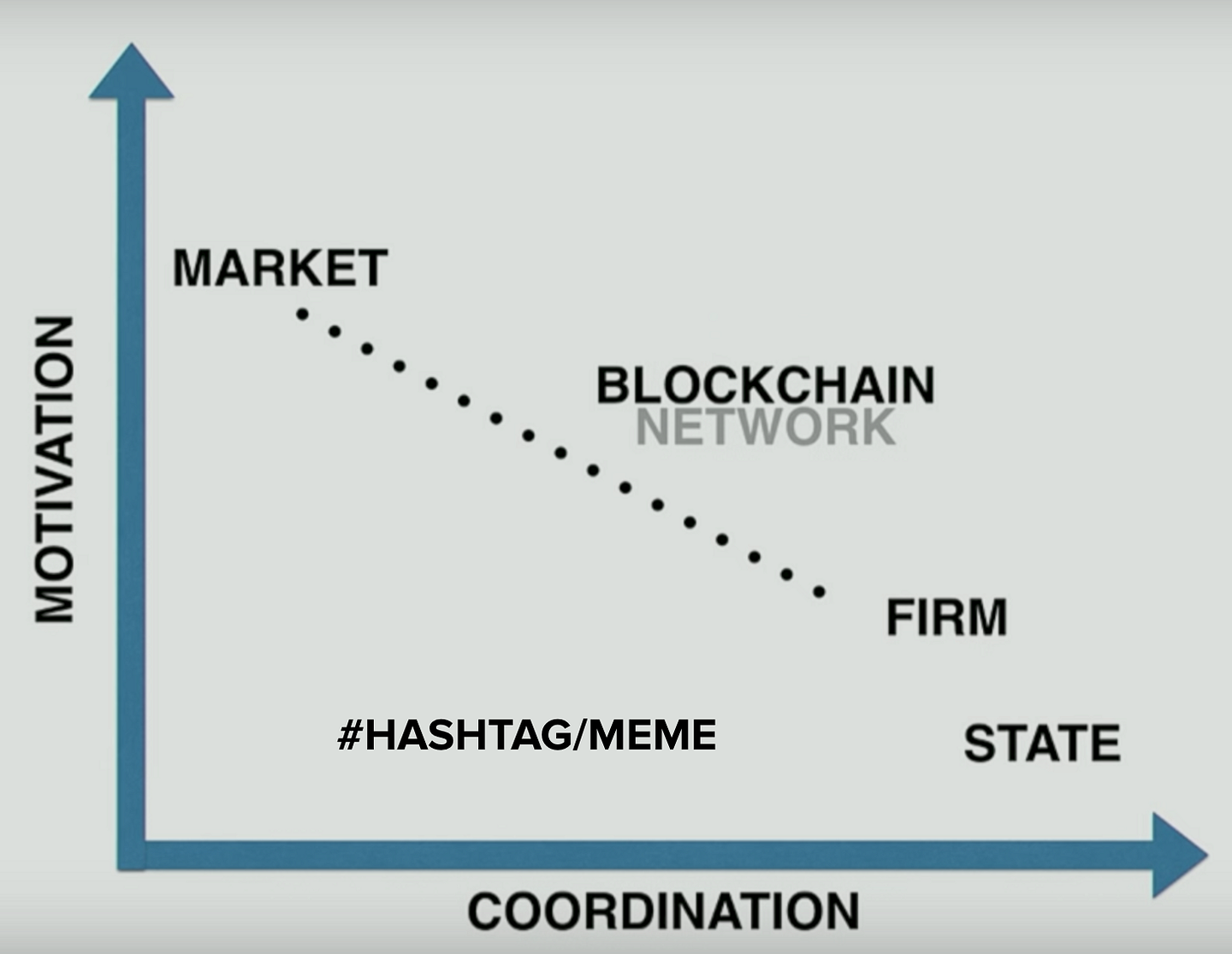
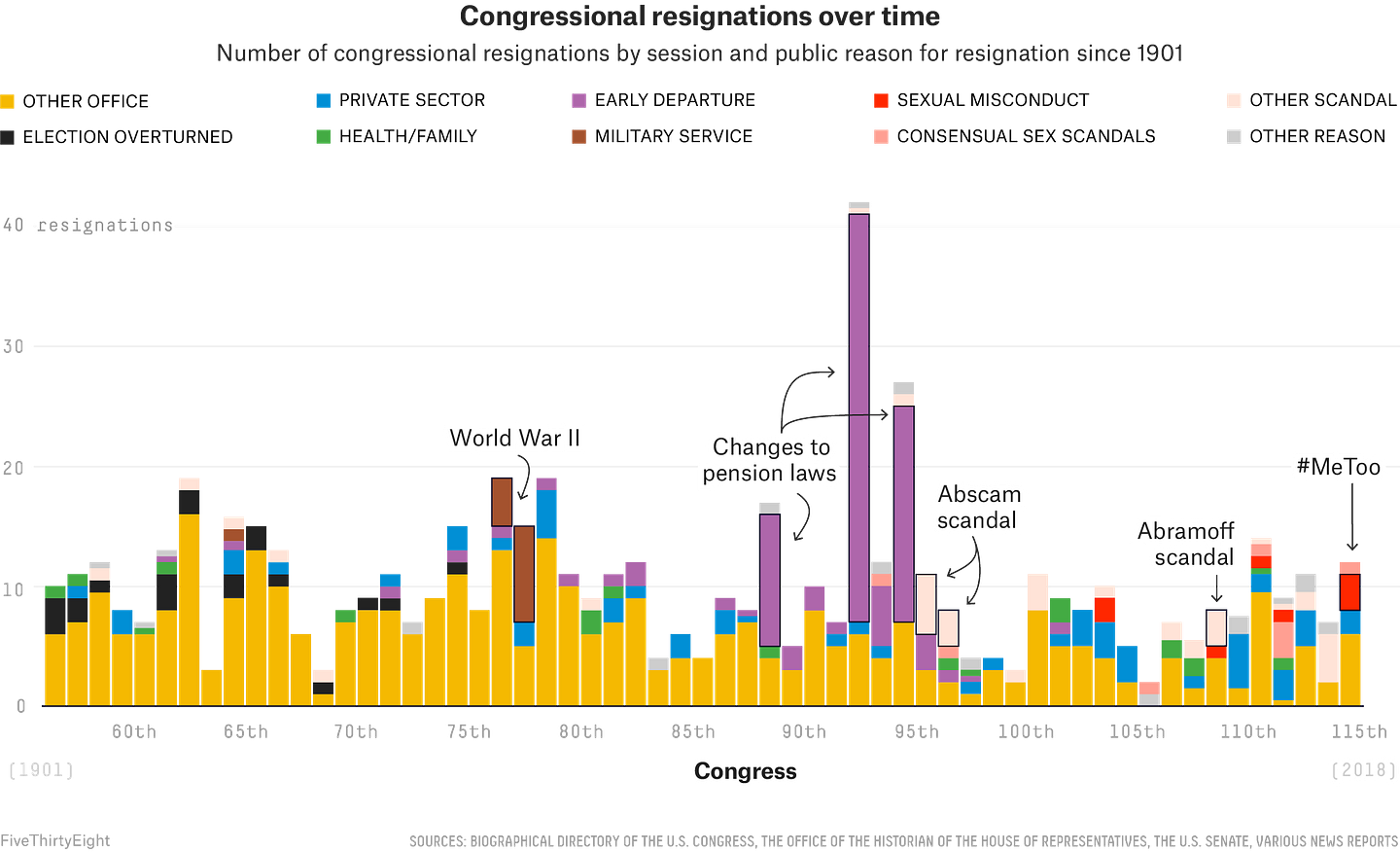
Other recent meme examples: #BUIDL, #MovingForward, #FoundersForChange, a crowd-sourced r/MemeEconomy newsletter that makes $500/month on Patreon.
Examples of an #ETHCommons Mindset (From November 2017 — March 2018)
Ok, so #ETHCommons is aggressive about not creating a company, but instead just using a meme. Let’s look at how people have “embodied” this meme in the past couple months. A couple notes:
- When I “started” #ETHCommons in October of 2017, there weren’t nearly as many things that I’d categorize as #ETHCommons. Now, there are many more—hooray! (See the timeline below.)
- As far as I know, these projects aren’t actively thinking “I’m doing an #ETHCommons thing!” Instead, I am putting this tag on them (in a permissionless way!).
As far as I can tell, there are two key sub-memes that “qualify” for an #ETHCommons mindset:
- #CoEvolution to #SharedOutcomes. This means that we’re acknowledging the fact that we don’t live in a world defined by scarcity, win-lose outcomes, and competition. Instead, many of us share goals and we can collaborate (co-evolve) on them together.
- #CryptoPledge. This comes from a very similar mindset as above (coming from abundance not scarcity). But instead of thinking about the actions you take to get to your goal, this is about after you succeed—what should you do with the money you’ve made? #CryptoPledge says, “after I’ve made value (hopefully by #CoEvolving to #SharedOutcomes), I acknowledge that I have enough and will give back to support other parts of the system”.
Here’s a timeline of recent initiatives that embody #ETHCommons:

A lot has happened!
- In November and December we started to see an expansion of task-based bounty platforms: Status Open Bounty (Nov 2), Gitcoin (Nov 16), and Aragon Nest (Dec 6). I count these as #ETHCommons because they make it easier to self-tax (#CryptoPledge) to fund infrastructure. (They’re also #CoEvolving to a #SharedOutcome around Standard Bounties.)
- Those were followed by a couple big “Infrastructure Grants” programs: Ethereum Grants (Jan 2), ETHPrize (Mar 9), and ECF (Mar 24). I especially count ETHPrize and ECF as #ETHCommons because they involve lots of actors “solving” a coordination problem (free-rider/tragedy of the commons) to fund common infrastructure together (#CryptoPledge-ing to #CoEvolve to #SharedOutcomes).
- Besides direct funding, we also saw cross-project events, primarily stewarded by the Web3 Foundation (which was only formed Dec 8!). They organized a cross-project Decentralized Exchange workshop (Jan 23) and, along with Giveth, organized the cross-project event ScalingNow! (Mar 6). Also on the events front, ETHGlobal was announced (Feb 14).
- Finally, Robbie Bent from Truebit and Tor Blair from Enigma co-founded a cross-project group of community managers, called the Community of Communities (Dec 29).
I want to re-emphasize my excitement around cross-project infrastructure funding, because it wasn’t happening before and it’s an example of #CryptoPledge-ing to #CoEvolve to #SharedOutcomes. Earlier, ConsenSys was the primary funder of Ethereum infrastructure (thanks Joe!). It looked like this:
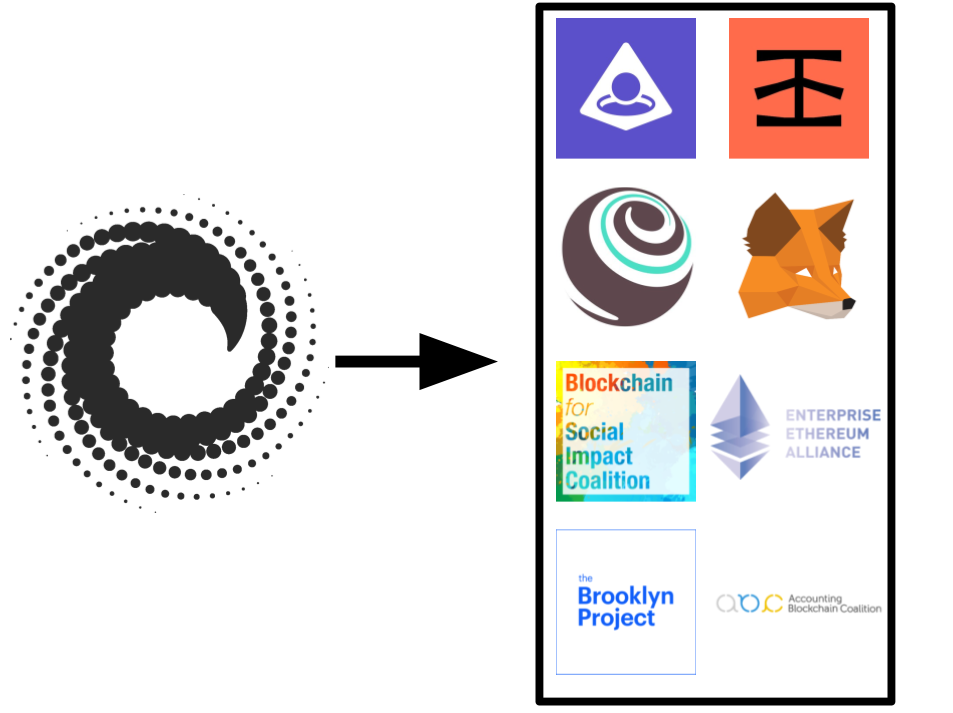
But ECF, ETHPrize, and ETHGlobal were funded by multiple entities, like this:
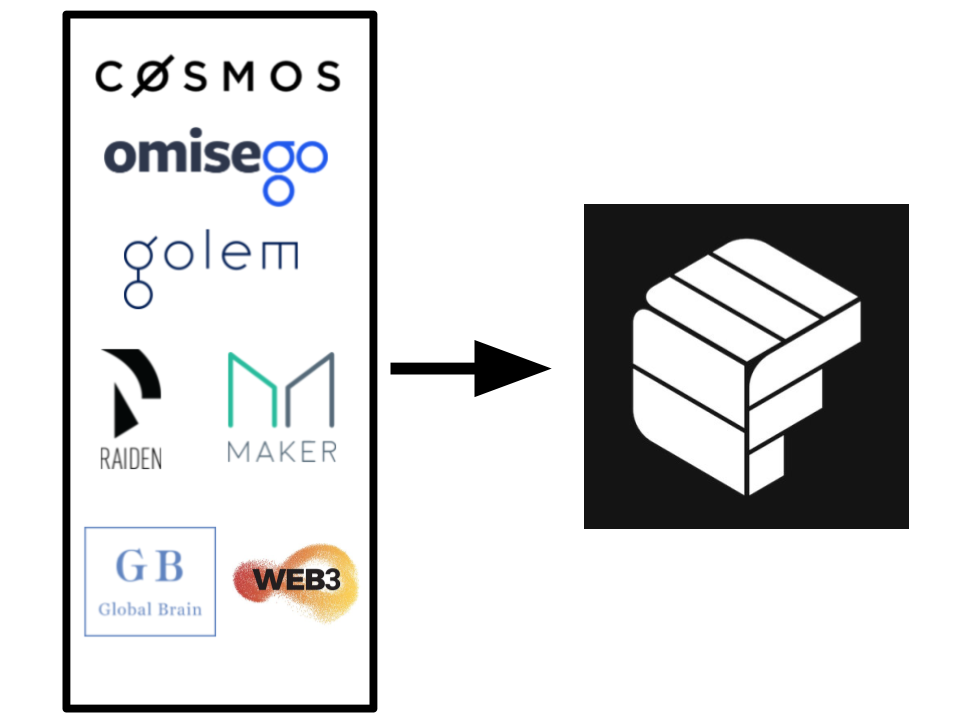
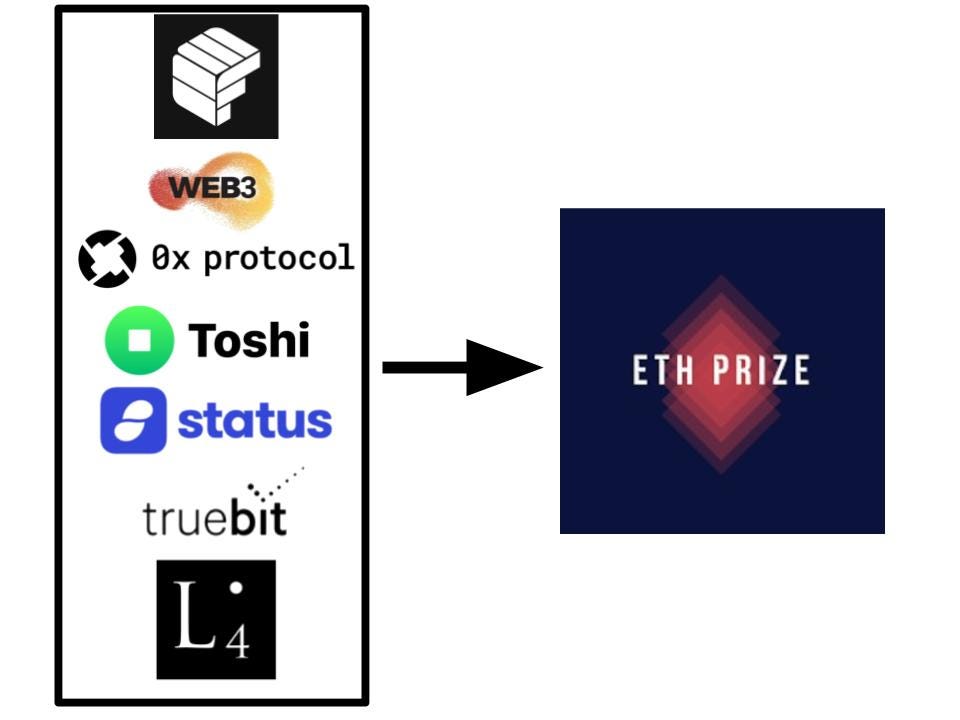
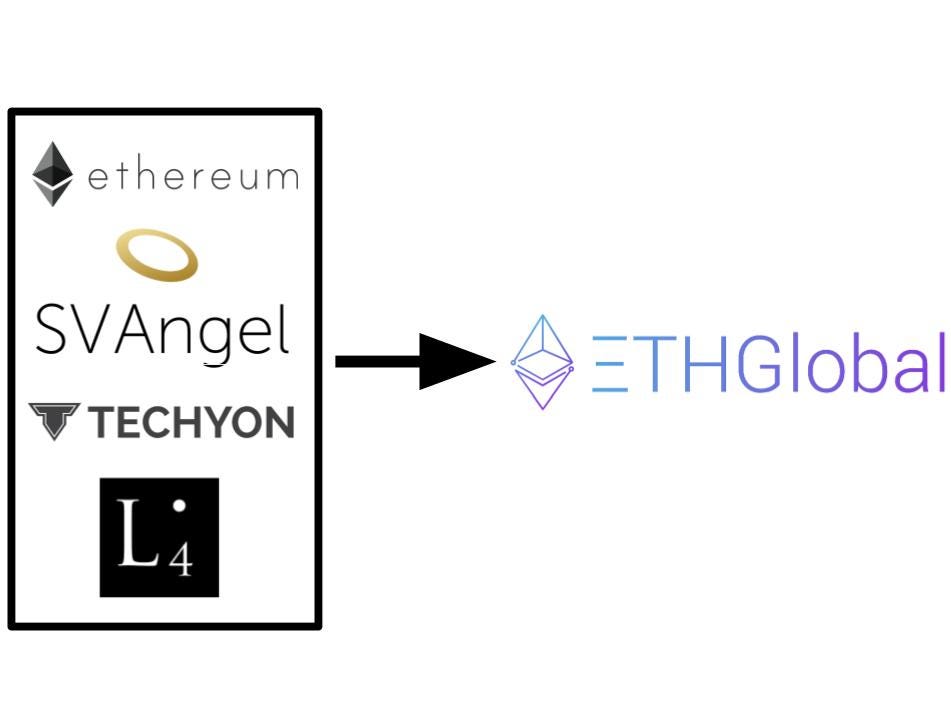
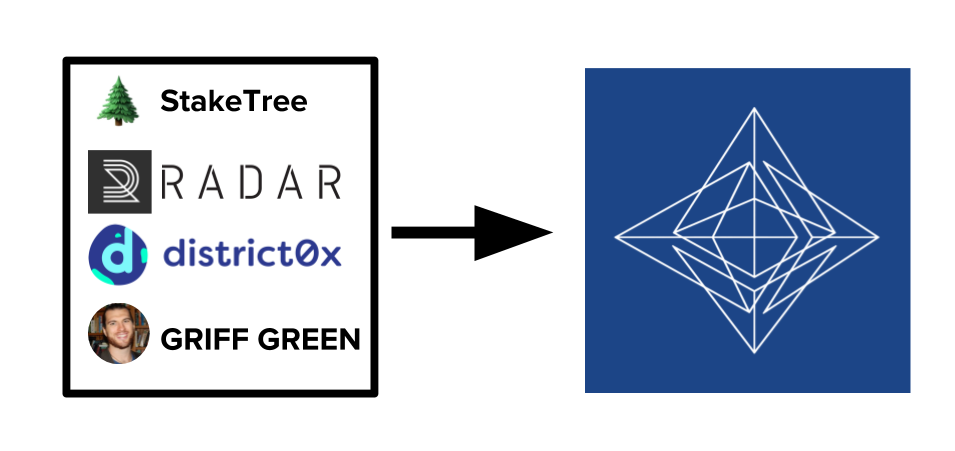
It’s like a multi-party VC funding round, but for infrastructure—it’s great! Thank you all! Here are some other examples of similar “commons” work that’s being done in the ecosystem:
- Plasma Implementer Calls
- Spankchain’s $300,000 grant to Cipher Browser
- Nick Johnson’s Corner Case (doing live Q&A for Ethereum devs)
- Ethereum Magicians (ETH Meta-governance)
- Aragon Labs (Working groups with 0x, District0x, Ethfinex, Status, Democracy Earth, Giveth, Decentraland)
And some examples that aren’t specific to ETH:
- Proof of Work Common App (Feb 26)
- Coinbase: $25,000/month to support open-source (March 8)
- Coinbase: Protocol Team (March 16)
What Did #ETHCommons Itself Actually Do?
For most of the examples above, I (or #ETHCommons) didn’t actually have anything do with the project (as far as I know). So what did I do?
(Note: The goal here isn’t to say “look at me, I did, x, y, z!” It’s more of a reflection on what I’ve done and something to show possible future sponsors of #ETHCommons.)
1. Cross-Project Facilitation
#ETHCommons places people (mostly just me right now) in the “commons” to help projects collaborate with each other. I’m able to do this because my “incentive set” is quite different from someone in a specific company. I just want to provide value for the ecosystem generally, find blind-spots in-between projects (in the commons), and help projects achieve shared goals. So, while it might be more difficult for someone at a specific company to carve out time in their busy schedule to help the ecosystem, helping the ecosystem is what I’m optimized for.
Given that, here are specific examples of this cross-project facilitation that I’ve done in the last couple months:
- Cryptoeconomic Primitives Circle #1
- Cryptoeconomic Primitives Circle #2
- How To: Organize a Crypto Event/Hackathon
- Leveraging Crypto Events
- Community of Communities — Lean Coffee 3 w David Spinks
- Decentralized Governance Circle #1
ETHDenver was another big example of this cross-project facilitation.
2. Speaking about #ETHCommons in the Context of Abundance
In addition to actual cross-project facilitation, I’ve also spoken about #ETHCommons in the context of abundance:
- Live Two-Way Interview with Ryan Martens and Rhys Lindmark: Living an Infinite GameB in Crypto
- Global Blockchain Summit (video soon)
- Ethereum Toronto (20min video)
- Bay Area Effective Altruists (60min video)
3. Propagating a Bottom-Up Peer-to-Peer Commons Funding Mechanism
So this one is a bit more strange and I’m not sure the best way to explain it. At a high level, I’d love to turn value transfer into an organic system of transparent flows. Right now, that means I want to empower others to do what I’ve done (be peer-funded by the ecosystem). To achieve this end, Niel de la Rouviere and I have just “self-taxed” ourselves to award a $2400 grant to a new #ETHCommons Co-Steward. More on her and how she’ll be helping the ecosystem soon!
What’s Next?
There are a couple areas of focus going forwards:
- Continue the work described above: cross-project facilitation, written content, and speaking.
- Onboard and mentor the new #ETHCommons Co-Steward.
- Experiment with new forms of cross-project facilitation, like sharing which events people are attending to create shelling points for the ecosystem.
- Experiment with new audiences for cross-project facilitation, primarily those who are interested in pushing the #ETHCommons mindset.
- Move to the protocol layer and help with Ethereum Foundation, Web3, etc. In the next couple months, this could primarily mean ensuring the governance process around the Parity exploit goes smoothly.
If you’re interested in participating, join the ETHCommons Gitter!
Thanks again to Radar Relay, StakeTree, district0x, and Griff Green for taking the initial risk to sponsor this project. Now I’d like to “round robin” who supports, so I’m looking for new support. If you would like to support #ETHCommons, please do so through my StakeTree or Patreon. Or, better yet, reach out! My email is rhyslindmark@gmail.com. Once I raise a small amount for the next 3–6 months, I’ll publicly feature your support!
Thanks to Collin Brown, Mike Goldin, John Desmond, Paras Chopra, Andrew Cochrane, Sandra Ro, Harry Lindmark, Jonny Dubowsky, Sam Jonas, Malcolm Ocean, Colin Wielga, Joe Urgo, Josh Nussbaum, John Lindmark, Garry Tan, Jacob Zax, Doug King, Katie Powell, Mark Moore, Jonathan Isaac, Coury Ditch, Ref Lindmark, Mike Pratt, Jim Rutt, Jeff Snyder, Ryan X Charles, Chris Edmonds, Brayton Williams, Brian Crain, Ali Shanti, Patrick Walker, Ryan Martens, Kenji Williams, Craig Burel, Scott Levi, Matt Daley, Peter Rodgers, Keith Klundt, Alan Curtis, Kenzie Jacobs, and James Waugh for supporting me on Patreon! Thanks to Storecoin, Griff Green, Radar Relay, district0x, Niel de la Rouviere, Brady McKenna, and some anonymous others for supporting me on StakeTree! Thanks to Shapeshift for sponsoring my podcast! Please use them/check them out!
Hit me up on Twitter!
Disclaimer: I own less than $5000 of any given cryptocurrency, so my monetary incentive is not too aligned with Bitcoin, Ethereum, etc. :)